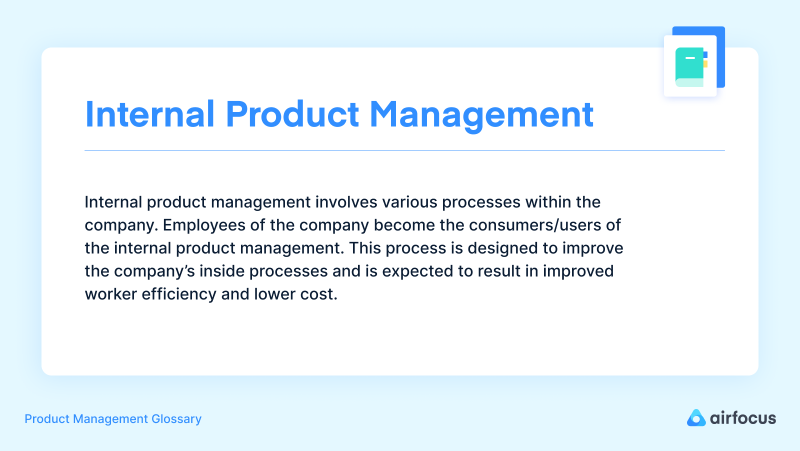Internal Product Management
What is internal product management?
Internal Product Management Definition
Internal product management involves various processes within the company. Employees of the company become the consumers/users of the internal product management. This process is designed to improve the company’s inside processes and is expected to result in improved worker efficiency and lower cost.
What does an internal product manager do?
Internal product managers build products to satisfy internal users. Internal PMs ultimately aim to help people in their company work more efficiently by applying product management techniques to internal platforms. Internal product managers need to evaluate how workers use programs and methods and watch for any future problems. Such tools usually operate workflows and processes that employees leverage in their everyday work.
Internal product managers make an average of $100,495 per year.
Internal vs. External product management
Of course, when talking about internal product management, it’s impossible not to compare it to its opposite, external product management. External product management is similar to internal product management, except your focus is directed outward toward the customers rather than inward toward your team.
Here are some key questions to consider when comparing these two product management styles.
Who is the customer?
One of the major differences between internal product management and external management is how you define your customer. In external product management, the customer is pretty straightforward: It’s your users, your buyers, various demographics, or even society at large.
When it comes to internal product management, though, your “customers” will be very different. They will be groups like your employees, owners, and representatives.
In other words, whichever management style you’re considering, your customers will be the people using and investing in your product. Internally, that’s the team at your workplace. And externally, that’s a more traditional definition of “customer.”
What role do internal PMs play in building internal products?
Internal product managers play a vital role in building internal products. They are the lead on these projects, guiding the design, development, and marketing teams to create a valuable product.
They also manage the relationships between these teams and the relevant stakeholders. That means communicating between clients and coworkers to ensure that everyone remains on the same page throughout the product’s development.
The internal product manager is more or less the person who maintains the vision for the product. They maintain this vision from start to finish, ensuring that everything stays on track.
How Product Market Fit is different in internal vs. external situations
Product Market Fit is the last major difference to consider when looking at internal and external product management. The major difference between internal and external Product Market Fit is where you look to match the product to the user.
Internally, you’ll be researching your internal team and staff, their workflows and needs, and so on. Matching the product to the customer is less about securing sales and more about meeting your team's needs.
Externally, Product Market Fit becomes about developing a deeper understanding of your target demographic. You’ll do this through testing, surveys, etc.
Internal PM examples
When it comes to internal product management, there are several instances where you may find the skills of a product manager necessary. Here are a few examples:
Human Resources Information Systems (HRIS)
The first example is Human Resources Information Systems or HRIS. Relying on internal product management when handling HRIS is key to updating your HRIS tools and ensuring that they’re updated.
HRIS tools are vital to keeping the HR department running smoothly, but this can also be a neglected development area. Using internal product management is a great way to ensure that you not only support this department but also provide practical tools.
Customer Relationship Management (CRM)
Internal product management strategies can also come in handy when choosing or creating a CRM solution. These are crucial in today’s world for efficient and effective marketing. By using internal product management, you can pick a great CRM tool and find the one that’s right for your customers.
Enterprise Resource Planning (ERP)
Finally, you can use internal product management when launching Enterprise Resource Planning (ERP) tools. ERP tools help your business allocate resources and decide where to invest. Using internal product management strategies is crucial because successful ERP selection/creation can have a lasting impact on your business’s success.
Internal product manager challenges
Internal product managers have a unique job, so they face a handful of unique challenges, including:
They need to explain the value of their work to upper management. Since internal product management doesn’t generate direct revenue, it can be a harder sell than external product management.
Internal products don't have a marketing team, so it’s up to internal product managers to spread the word.
Stakeholders’ demands don’t always align with internal product management solutions, so you need to balance their requests with your plans.
It’s easy to deviate from the product strategy. It becomes easy to forget about initially planned development if you get overwhelmed by requests, bug/support issues, and user stories.

General FAQ

Glossary categories
Experience the new way of doing product management

Experience the new way of doing product management








